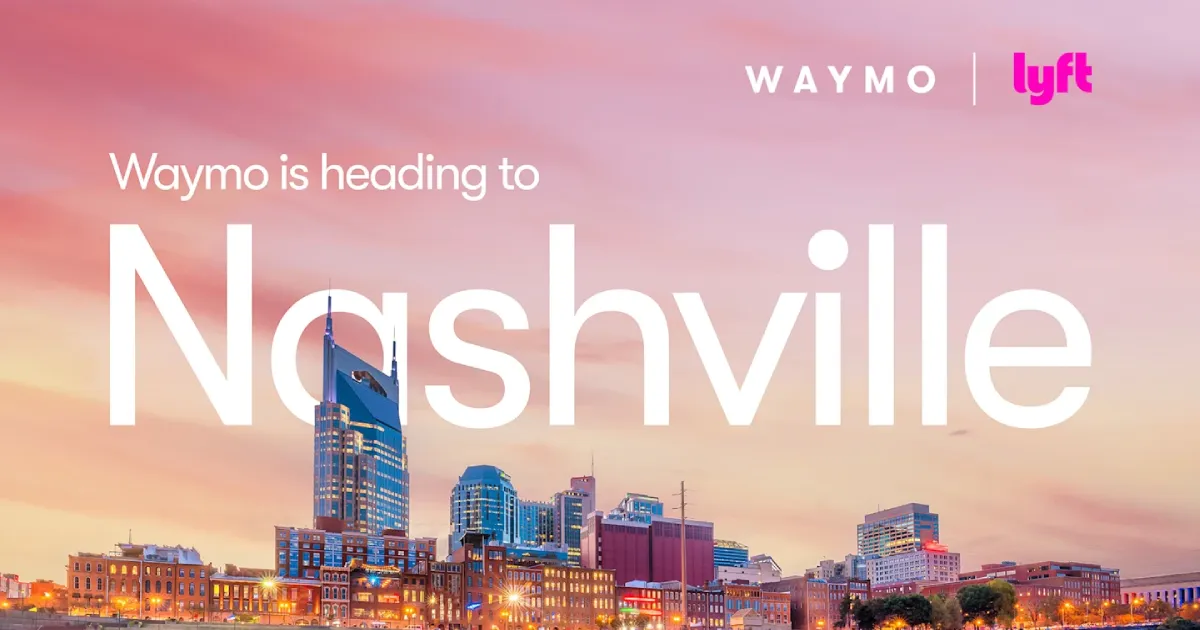Waymo and Lyft partner to launch robotaxis in Nashville

Waymo is bringing its self-driving cars to Music City. The Alphabet-owned autonomous vehicle company announced Wednesday that it has struck a deal with ride-hailing giant Lyft to launch a robotaxi service in Nashville in 2026, marking a major expansion of its growing U.S. footprint.
The rollout will begin with testing in the coming months, as Waymo deploys its fleet of all-electric, autonomous Jaguar I-Pace SUVs across the Nashville area. A public launch is expected next year, giving residents and visitors the chance to book fully driverless rides.
Expanding Beyond Phoenix
Waymo’s Nashville plans are part of a larger push to scale its robotaxi business beyond Phoenix, where the company first launched commercial operations. The service has since reached Atlanta, Austin, Los Angeles, and San Francisco, with previously announced expansions slated for Miami, Washington D.C., Dallas, and Denver.
A Shift in Strategy: From Operator to Tech Provider
The Nashville partnership illustrates Waymo’s evolving strategy. Rather than operating every aspect of its service, the company is increasingly positioning itself as a technology provider while outsourcing fleet operations.
Earlier this year, Waymo launched robotaxi services in Atlanta and Austin through a partnership with Uber. In those cities, Waymo oversees vehicle testing, roadside assistance, and rider support, while Uber handles fleet logistics such as cleaning, maintenance, inspections, charging, and depot operations through its partner Moove Cars.
In Nashville, the Lyft arrangement mirrors this structure. Lyft will manage vehicle readiness, infrastructure, and depot operations through its subsidiary Flexdrive. The company also confirmed it is investing in a purpose-built autonomous vehicle facility to support the fleet.
Key Difference: Dual App Access
One notable distinction sets the Lyft partnership apart from the Uber deal. In Nashville, customers will be able to hail robotaxis through both the Waymo app and the Lyft app. The service will initially launch via Waymo’s platform, with Lyft integration coming later as the rollout scales.
That’s a contrast to Atlanta and Austin, where customers must rely solely on the Uber app—and hope they’re matched with a driverless vehicle rather than a human driver.
A Renewed Partnership
Waymo and Lyft have a history of collaboration, though never at this scale. Back in 2019, the companies piloted a small integration in Phoenix, adding a handful of Waymo vehicles to Lyft’s ride-hailing network. The new Nashville venture, however, marks the first time the companies are pursuing a large-scale robotaxi service together.
With this deal, Waymo further cements its position as a leader in autonomous vehicle deployment, while Lyft deepens its bet on a future where ride-hailing fleets no longer require human drivers.
If the launch proves successful, Nashville could become a model for how traditional ride-hailing companies and autonomous vehicle developers work hand-in-hand to bring robotaxis into the mainstream.





